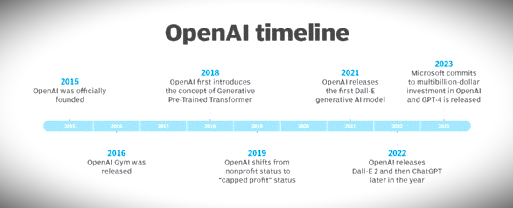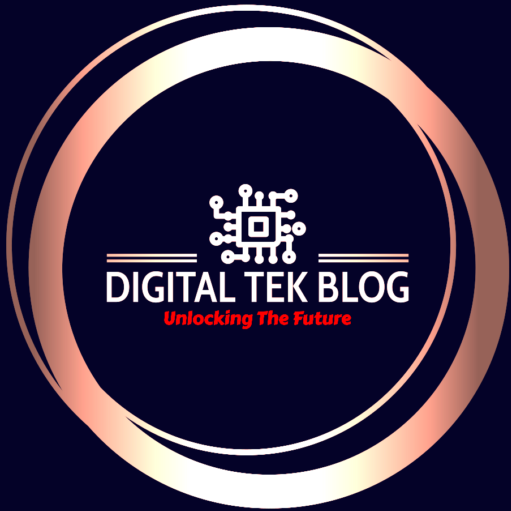“OpenAI” is a non-profit artificial intelligence research company. Our goal is to advance digital intelligence in a way that is most likely to benefit humanity as a whole, unconstrained by a need to generate financial returns.
What is OpenAI?
OpenAI is a private research organization dedicated to developing and directing artificial intelligence (AI) in ways that benefit all of humanity. The company was founded in 2015 by Elon Musk and Sam Altman and is headquartered in San Francisco.
OpenAI was created out of its founders’ existential concerns about the potential for disaster caused by carelessness or misuse of general-purpose AI. The company has a long-term focus on fundamental advances in AI and its capabilities. The company’s founders and other investors founded the company with an endowment of $1 billion. In February 2018, Elon Musk resigned from Tesla, the Nikola Tesla-inspired car and clean energy company, citing a potential conflict of interest with his work at the company.
The company’s stated intention to work toward achieving safe artificial general intelligence (AGI) for the benefit of humanity is reflected in its goal to freely collaborate with other research organizations and individuals. Research and patents created by the company will be made available to the public, as long as they do not adversely affect safety.
History and timeline of OpenAI
OpenAI initially focused on developing AI and machine learning tools for video games and other entertainment purposes. On December 11, 2015, less than a year after its official founding, the company released its first AI product, an open-source toolkit for developing reinforcement learning (RI) algorithms called OpenAI Gym. For the next two years, OpenAI focused on more general AI development and AI research.
In 2018, OpenAI published a report telling the world what a generative pre-trained transformer (GPT) is. GPT is a neural network, or machine learning model, that is built to function like the human brain and is trained on inputs such as large data sets to generate outputs or answer user questions. Meat.
In March 2019, OpenAI transitioned from non-profit to for-profit status and became officially known as OpenAI LP, taking over from its parent company, OpenAI Inc., which is managed by OpenAI. Nearly two years later, in January 2021, it introduced Dall-E, a generative AI model that analyzes nature. It takes linguistic text from a human user and creates an image based on what the text says.
Perhaps the company’s best-known product is ChatGPT, which was released in November 2022 and is known as the world’s most advanced chatbot due to its ability to provide users with answers on an unlimited number of topics. Its advantages and disadvantages and its use in various industries are still under debate.
Elon Musk no longer serves on the company’s board and is joined by co-founder Sam Altman as chairman and president Greg Brockman, former chief technology officer of financial services and SaaS company Stripe. With them, he served as CEO of the company until November. 2023. Former Google Chief Scientist, Ilya Satskeva.
In November 2023, Mr. Altman was dismissed from his position by the Board of Directors for not being forthright in his communications with the Board. Shortly thereafter, Brockman left the company. Both were hired by Microsoft three days after leaving the company.
Following Altman’s departure, Twitch co-founder Emmett Shea was appointed as interim CEO of OpenAI. Following Altman’s dismissal, approximately 500 OpenAI employees said they planned to walk out unless the company’s board resigned. Just five days later, Altman and Brockman were reassigned to their original roles at OpenAI with a new board of directors.

Notable projects and releases
OpenAI is considered innovative as it offers notable products such as:
• GPT-3. This powerful language model serves as the foundation for other OpenAI products. Learn how to analyze human-generated text and generate similar text yourself.
• Dall-E and Dall-E 2. These generational AI platforms can analyze text-based descriptions of the images users want to create and generate those images as described.
• Clip. Clip is a neural network that synthesizes scenes and their associated text to predict the best caption that most accurately describes those scenes. It can be classified as a multimodal AI due to its ability to learn from multiple types of data (both images and text).
• ChatGPT. ChatGPT is currently the most advanced AI chatbot designed to generate human-like text and answers to user questions. Because it was trained on a large dataset, it can generate answers and reactions just like humans. Since the creation of this tool, updates have made it possible to communicate with users through voice conversations and images.
• Codex. Codex was trained on billions of lines of code in different programming languages to help software developers simplify the coding process. It is based on GPT-3 technology, but instead of generating text, it generates code.
• whisper. Whisper is labeled as an automatic speech recognition (ASR) tool. It is trained on large amounts of audio data to recognize, transcribe, and translate speech in nearly 100 different languages, including jargon and different accents.
• ChatGPT Enterprise. It is similar to the consumer version of ChatGPT, but the enterprise version allows users to create model training. This version also reflects recent incremental changes made to ChatGPT.
• Custom GPT. GPT Chat is a custom version of GPT that users can customize for specific use cases without any code. Verified GPT builders can share their custom GPT on the GPT store and earn money from it.
OpenAI and Microsoft
As early as 2023, Microsoft publicly committed to investing billions of dollars in OpenAI, but Microsoft’s interest in the company is not new. In July 2019, OpenAI entered into a multi-year partnership with Microsoft to empower Microsoft’s cloud platform, Azure, with AI-based computing products.
Microsoft’s latest investment in OpenAI extends to its search engine, Bing. The company is using the same technology it developed for ChatGPAT to create an AI-powered version of Bing. At the same time, AI-based features are also being added to Microsoft’s Edge browser, and ChatGPT functionality is being added to Microsoft 365 products like Outlook and Teams.
[icon name=”hand-point-right” prefix=”fas”] Related Topics:
Criticisms of OpenAI
Despite these rapid advances, OpenAI is not immune to criticism in the technology world and beyond. The company’s transition from “not-for-profit” to “restricted profit” status in 2019 meant the company’s efforts to collaborate with other companies to build “safe and useful” general artificial intelligence led to cutting-edge technology. There is growing criticism that this is turning into a profit-driven “AI arms race.”. AI technologies are on the market. Also, given that OpenAI is committed to developing open source software, concerns are being raised about the increasing lack of transparency about how its successful products are being developed. There are some like that, too.
More recently, ChatGPT’s launch in late 2022 was met with considerable criticism, but also widespread praise for its groundbreaking features. The technology has been accused of producing “illusory” and other factually incorrect answers that do not stand up to scrutiny even when apparently intelligent and well-written. This is perhaps the most notorious shortcoming of the platform, but other shortcomings include the possibility of plagiarism from other sources and limitations when creating answers about the latest news. The dataset used for training is from 2021, so the content generated may have a negative impact on people who need information about current events. OpenAI updated ChatGPT Plus in November 2023 to include information up to April of the same year.
OpenAI’s chatbot is one of several bots that faced security concerns in early 2023. In addition to the helpful functions of these resources, researchers also detected harmful content among the responses. Examples of this include information on how to make bombs and guidance on how to commit identity theft or steal from a charity.
International skepticism about AI continues to emerge. For example, the governments of France and Italy have provided requests and evaluations for OpenAI. Meanwhile, the US White House requested more information on the risks associated with AI.
There is also a copyright dispute with OpenAI. In June, the producers came under intense scrutiny following allegations from the law firm of Joseph Saberi. The complaint, filed by five book authors, alleges that ChatGPT and its underlying large-scale language models (LLMs) (GPT-3.5 and GPT-4) contain copyrighted material. I showed that there is. Specifically, it accused these sources of using the works of authors in their summaries for the training of LLMs. This was done without the permission of the author.
The New York Times also filed a copyright infringement lawsuit in December 2023, alleging that OpenAI and Microsoft illegally copied articles to train LLMs to develop AI products that compete with The New York Times . The newspaper became the first major news organization to sue OpenAI and Microsoft for using their publications to train AI systems.
Amid concerns, steps are often taken to improve the system. In response to the skepticism surrounding ChatGPT, OpenAI launched ChatGPT Enterprise in August. This new version provides organizations with better visibility into the training of their models and the data within them. However, there is still a lack of clarity regarding the training data used in the model. Thus, companies share concerns about models that use copyrighted material for training.
OpenAI has also faced criticism over the lack of diversity on its board of directors. Critics said the lack of representation on the board is inconsistent with the company’s mission to “benefit all humanity.”. Following the dismissal and reappointment of Sam Altman in November 2023, OpenAI removed its only two female directors and reinstated an all-white male board. Lawmakers in Washington also recommended that OpenAI’s board of directors be diversified following the restructuring.
The future of OpenAI
OpenAI has not provided extensive public comment on its future plans, but based on recent investments, the democratization of AI is an explicit goal of the Microsoft and OpenAI partnership, with non-technical experts increasingly gaining access to AI. You should have more AI tools at your disposal that don’t require specialized knowledge.
In March 2023, OpenAI released GPT-4, the company’s latest upgrade to language model technology since GPT-3.5, the foundation of ChatGPT. GPT-4 is considered better than previous versions because it offers multimodal AI capabilities that can analyze images as well as text. Considering OpenAI’s latest releases, it’s clear that the company shows no signs of slowing down. OpenAI estimates that revenues will exceed $1 billion by 2024.
Microsoft is also taking steps that indicate the expected growth of OpenAI and similar resources. In early 2023, the company announced an investment of more than $13 billion in OpenAI. This investment, aimed at the continued use of AI for various purposes, received much support due to comparisons with the Internet revolution.
In the 1990s, Bill Gates issued a memo describing the Internet as a “tsunami” that would have a major impact on Microsoft. Microsoft CEO Satya Nadella recently referenced this memo, drawing parallels between the development of the Internet and AI. Additionally, Microsoft aims to use these tools to support innovation.
In parallel with the expected growth, OpenAI held its first developer conference in November 2023. At this event, OpenAI announced a language model with a significantly larger context window than its predecessor, a cheaper API pricing model, and a later API model, GPT-4 Turbo. Cut down on the training data. OpenAI also introduced customizable GPTs, a “copyright shield” that protects customers from legal action, and a GPT store that allows users to monetize and access custom GPTs.
In December 2023, OpenAI signed a deal with media company Axel Springer to use its news content in it’s products. This will allow ChatGPT to provide news summaries from Axel Springer’s news outlets, including Politico and Business Insider. This agreement signals OpenAI’s intention to explore opportunities in AI-powered journalism.
follow me : Twitter, Facebook, LinkedIn, Instagram

3 thoughts on “What Is OpenAI? Amazing Really!”
Comments are closed.